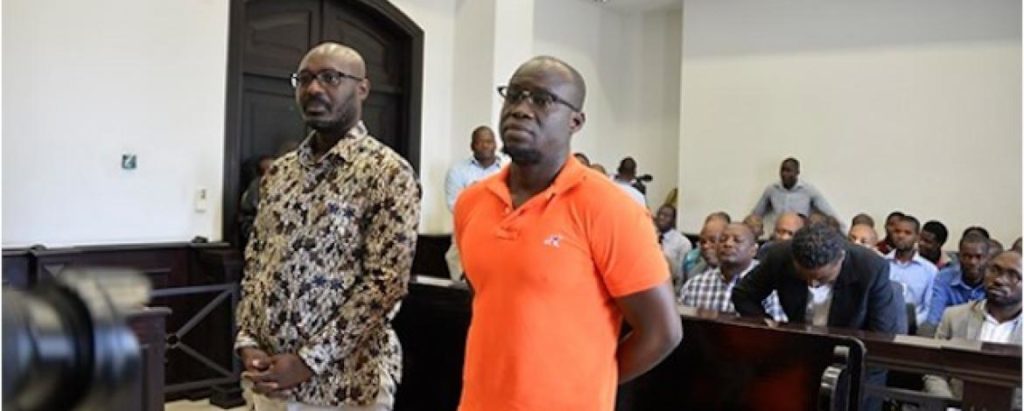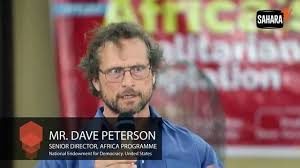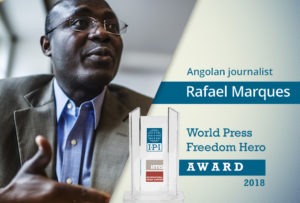
Investigative journalists Mariano Bras (right) and Rafael Marques (left). Credit: RSF
Angola is determined to enhance democracy, President João Lourenço told the European Parliament last week. His comments came shortly after the International Monetary Fund commended his administration for initiating reforms geared away from kleptocratic rule and towards growth that benefits all its people.
But some observers remain skeptical of the new regime’s commitment to reform.
 “Lourenco made a big show of firing the family members of former President Jose Eduardo dos Santos from senior positions — but, say critics, all this achieves is to change who benefits from corruption, rather than tackling the corruption itself,” according to one account.
“Lourenco made a big show of firing the family members of former President Jose Eduardo dos Santos from senior positions — but, say critics, all this achieves is to change who benefits from corruption, rather than tackling the corruption itself,” according to one account.
Yet the acquittal of investigative journalists Mariano Bras and Rafael Marques (above) on accusations of insulting the state represents a glimmer of hope for press freedom abroad, says the Washington Post.
 When I first visited Angola more than 20 years ago, it struck me as one of the most repressive countries I had ever encountered in Africa, notes Dave Peterson, the Senior Director of the National Endowment for Democracy’s Africa Program.
When I first visited Angola more than 20 years ago, it struck me as one of the most repressive countries I had ever encountered in Africa, notes Dave Peterson, the Senior Director of the National Endowment for Democracy’s Africa Program.
The power of the ruling MPLA seemed unassailable, the opposition seemed broken, and the independent press and civil society seemed weak and aimless. Although UNITA had some representation in the government, fighting was still going on, which would culminate in the killing of Jonas Savimbi in 2002 and the subsequent further consolidation of the regime. Since then, not a lot of progress has been apparent, and the increasingly rapacious and repressive tendencies of the government had seemed insurmountable, he told a recent NED forum:
 Shortly after that first visit I met Rafael, who was then working for the Open Society Institute in Southern Africa. He was a fierce critic of the government, and full of ideas. Some years later he was able to come to the Endowment as a Reagan-Fascell fellow for a brief respite from the pressure he was under back home, and since then we have been proud to support his work on Maka Angola, certainly one of the most prominent websites tackling human rights abuses and corruption in Africa, if not the world. With the recent changes in the government of Angola, the advent of Joao Lorenco and the fall of the Dos Santos ruling family, some degree of hope has returned, at least to international policy circles, if not in Angola as well.
Shortly after that first visit I met Rafael, who was then working for the Open Society Institute in Southern Africa. He was a fierce critic of the government, and full of ideas. Some years later he was able to come to the Endowment as a Reagan-Fascell fellow for a brief respite from the pressure he was under back home, and since then we have been proud to support his work on Maka Angola, certainly one of the most prominent websites tackling human rights abuses and corruption in Africa, if not the world. With the recent changes in the government of Angola, the advent of Joao Lorenco and the fall of the Dos Santos ruling family, some degree of hope has returned, at least to international policy circles, if not in Angola as well.
So this morning, what I would like to focus on is not so much the repression and corruption that remains, which Rafael does such a good job of documenting and exposing. Nor would I dare make any projections about the future trajectory of the government and the prospects for democratic reform in Angola. Instead, I would like to reflect on what the implications of Rafael’s work are for the international democratic movement in general, including the lessons and challenges going forward.
 My first observation is that despite all the repression, communist ideology, and single-party state aspirations that may once have existed, and despite the continuing democratic façade that must describe the current dispensation, we must take great comfort in the simple fact that Rafael is here with us today. And not just that he is alive and well, but that he is still working in Angola, fighting the corruption, fighting the human rights abuses, fighting for justice and democracy. These dissident voices, often very lonely, but often very courageous, will always manage to preserve some hope, some vision for an alternative that is free and democratic. It is very much in keeping with the Endowment’s mandate, not so much simply funding projects around the world, but in supporting brave individuals and their efforts to make the world more free. As long as these voices can be heard, as long as there is a flame still burning, then there is hope, because it can spread. Indeed, Rafael is no longer alone, he was never alone. New voices are following his example. Young rappers, bloggers, activists of all kinds are standing up and joining the fray, carving out more political space, demanding change. These voices must be nurtured and amplified.
My first observation is that despite all the repression, communist ideology, and single-party state aspirations that may once have existed, and despite the continuing democratic façade that must describe the current dispensation, we must take great comfort in the simple fact that Rafael is here with us today. And not just that he is alive and well, but that he is still working in Angola, fighting the corruption, fighting the human rights abuses, fighting for justice and democracy. These dissident voices, often very lonely, but often very courageous, will always manage to preserve some hope, some vision for an alternative that is free and democratic. It is very much in keeping with the Endowment’s mandate, not so much simply funding projects around the world, but in supporting brave individuals and their efforts to make the world more free. As long as these voices can be heard, as long as there is a flame still burning, then there is hope, because it can spread. Indeed, Rafael is no longer alone, he was never alone. New voices are following his example. Young rappers, bloggers, activists of all kinds are standing up and joining the fray, carving out more political space, demanding change. These voices must be nurtured and amplified.
 It is also worth noting that somehow the political opposition in Angola has also survived. It was weak, but may be growing stronger. It has been able to move around the country, to campaign in elections, to maintain offices, to participate in government. The political playing ground is far from free and fair. But nor has the opposition been entirely extinguished. By the same token civil society has survived, and information space has grown. This is not to acknowledge the benevolence of the government. It would surely have preferred a more authoritarian model. But the tenacity and struggle of independent parties, groups, and news outlets is worthy of recognition.
It is also worth noting that somehow the political opposition in Angola has also survived. It was weak, but may be growing stronger. It has been able to move around the country, to campaign in elections, to maintain offices, to participate in government. The political playing ground is far from free and fair. But nor has the opposition been entirely extinguished. By the same token civil society has survived, and information space has grown. This is not to acknowledge the benevolence of the government. It would surely have preferred a more authoritarian model. But the tenacity and struggle of independent parties, groups, and news outlets is worthy of recognition.
 Second, the dictators get old. They may grow weaker. They will always die. Perhaps they will groom successors to continue their legacy, and it may take many years, maybe decades, but change happens, and it is important to be prepared for it. Like Dos Santos, Mugabe has been ousted from power by one of his longstanding henchmen, who has now assumed the mantle of reform. In Ethiopia, Meles Zenawi died in office, but his carefully chosen successor could not hold on to power, and a reformer has emerged from within the ruling party to embark on a democratic transformation. Who will be next? Burkina Faso, the Gambia, now Malaysia and Armenia as well, show that the entrenched dictators are not forever. But the dissident voices must find their opportunity to move quickly, strategically and carefully. They must have laid the foundations, identified the entry points, and understood the levers of power. We have found that these regimes are vulnerable, susceptible to pressure, ultimately mutable. It is not easy to govern, and there will be resistance to democratic reform, so the democrats need support, training, money, patience, advice, discipline.
Second, the dictators get old. They may grow weaker. They will always die. Perhaps they will groom successors to continue their legacy, and it may take many years, maybe decades, but change happens, and it is important to be prepared for it. Like Dos Santos, Mugabe has been ousted from power by one of his longstanding henchmen, who has now assumed the mantle of reform. In Ethiopia, Meles Zenawi died in office, but his carefully chosen successor could not hold on to power, and a reformer has emerged from within the ruling party to embark on a democratic transformation. Who will be next? Burkina Faso, the Gambia, now Malaysia and Armenia as well, show that the entrenched dictators are not forever. But the dissident voices must find their opportunity to move quickly, strategically and carefully. They must have laid the foundations, identified the entry points, and understood the levers of power. We have found that these regimes are vulnerable, susceptible to pressure, ultimately mutable. It is not easy to govern, and there will be resistance to democratic reform, so the democrats need support, training, money, patience, advice, discipline.
 Thirdly, let us acknowledge the importance of solidarity. Rafael’s bravery, talent and charisma won him many admirers outside of Angola as well as within. And it was this growing public support, certainly internationally, but also domestically, and I dare say even within the regime, that served to protect him. There have been assassination attempts and arduous legal battles, constant harassment and threats, but the regime had to be cautious, it could not risk international condemnation, and Rafael has survived, has prevailed to this day. One may deplore the general fecklessness of the international community, greedy for a share in the oil wealth that the regime has so liberally deployed to consolidate its rule and enrich its friends. But not everyone was on the take, not everyone could be silenced. Governments could be shamed, news media could spread the word, and judicial systems could be forced to rule freely and justly.
Thirdly, let us acknowledge the importance of solidarity. Rafael’s bravery, talent and charisma won him many admirers outside of Angola as well as within. And it was this growing public support, certainly internationally, but also domestically, and I dare say even within the regime, that served to protect him. There have been assassination attempts and arduous legal battles, constant harassment and threats, but the regime had to be cautious, it could not risk international condemnation, and Rafael has survived, has prevailed to this day. One may deplore the general fecklessness of the international community, greedy for a share in the oil wealth that the regime has so liberally deployed to consolidate its rule and enrich its friends. But not everyone was on the take, not everyone could be silenced. Governments could be shamed, news media could spread the word, and judicial systems could be forced to rule freely and justly.
 Finally, I would like to take note of the democratic spirit, which animates all of this. We must become more assertive in promoting our values. Kleptocrats and dictators have become skilled at buying collaborators, silencing critics, and deceiving the people. Some of them have even been successful in generating security and economic development. Democrats have often failed. But it’s not just a competing political system, one of many. I would like to think that freedom is an intrinsic value, that it is superior, and that human beings will prefer freedom over repression, and that even if it starts out with just a small band of true believers such as Rafael, that a peaceful, nonviolent, democratic path to freedom is possible. It will take some courage, some creativity, some sacrifice, but it is possible. So, thank you, Rafael.
Finally, I would like to take note of the democratic spirit, which animates all of this. We must become more assertive in promoting our values. Kleptocrats and dictators have become skilled at buying collaborators, silencing critics, and deceiving the people. Some of them have even been successful in generating security and economic development. Democrats have often failed. But it’s not just a competing political system, one of many. I would like to think that freedom is an intrinsic value, that it is superior, and that human beings will prefer freedom over repression, and that even if it starts out with just a small band of true believers such as Rafael, that a peaceful, nonviolent, democratic path to freedom is possible. It will take some courage, some creativity, some sacrifice, but it is possible. So, thank you, Rafael.
The above comments were made to a recent NED forum on João Lourenço’s First Year: Prospects for Reform in Angola.







